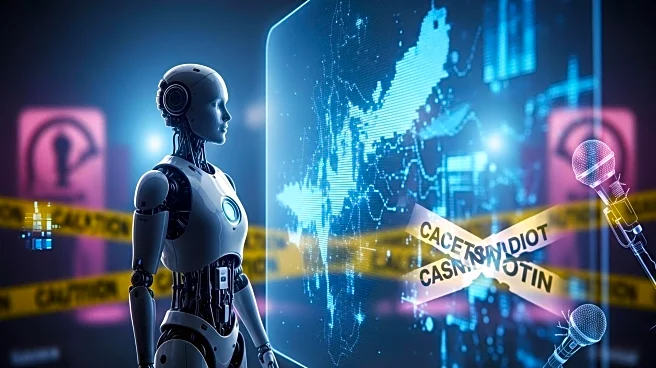What's Happening?
OpenAI has launched Sora 2, an advanced AI model powering a TikTok-style video app that has quickly gained popularity, reaching the third spot on Apple's App Store. Despite requiring an invite code, the app has gone viral, particularly with deepfake videos, including one of CEO Sam Altman shoplifting GPUs. The release has reignited internal debates at OpenAI about balancing safety with creative freedom. The company has implemented multiple safeguards to prevent unsafe content, such as prompt filtering and output moderation, but some users have found ways to bypass these protections. Sora 2 is a significant improvement over its predecessor, generating longer and more realistic video clips.
Why It's Important?
The launch of Sora 2 highlights the ongoing tension between innovation and regulation in the tech industry. OpenAI's rapid development and deployment strategy, while maintaining its competitive edge, raises concerns about the potential misuse of AI-generated content. The app's ability to create realistic deepfakes could have significant implications for privacy, security, and intellectual property rights. As OpenAI continues to push the boundaries of AI technology, it faces scrutiny over its responsibility to prevent harmful content while fostering innovation. The outcome of this balance could influence future AI policy and regulation, impacting tech companies, content creators, and users alike.
What's Next?
OpenAI is likely to face increased pressure to enhance its content moderation and safety measures as Sora 2 continues to gain traction. Legal challenges regarding the use of copyrighted material without explicit consent may also arise, potentially leading to changes in OpenAI's policies. The company will need to navigate these challenges while maintaining its competitive position against rivals like Meta, Google, ByteDance, and Alibaba, who are also developing similar AI video technologies. The industry will be watching closely to see how OpenAI addresses these issues and whether it can set a precedent for responsible AI innovation.
Beyond the Headlines
The development of Sora 2 raises ethical questions about the role of AI in content creation and the potential for misuse. The ability to generate realistic deepfakes could lead to misinformation and manipulation, challenging societal norms around trust and authenticity. As AI technology becomes more integrated into everyday life, there is a growing need for ethical guidelines and frameworks to ensure its responsible use. OpenAI's approach to these challenges could influence broader discussions on AI ethics and governance, shaping the future of AI development and its impact on society.









